Sleep apnea is a common sleep disorder that affects millions of people worldwide. If you suspect you may have sleep apnea, it is important to undergo proper testing to diagnose the condition and determine the best course of treatment. In this comprehensive guide, we will explore everything you need to know about sleep apnea tests in Perth, including the science behind sleep apnea, common symptoms and risks, the importance of testing, the different types of tests available, how to prepare for a sleep apnea test, and how to interpret the test results.
Understanding Sleep Apnea
Before we delve into the specifics of sleep apnea tests, it’s essential to understand what sleep apnea is and how it affects your health. Sleep apnea is a disorder characterized by interruptions in breathing during sleep. These interruptions, known as apneas, can occur multiple times throughout the night and lead to fragmented sleep and decreased oxygen levels in the body.
In Australia, sleep apnea test Perth are available through various clinics, hospitals, and specialized sleep centers. The process typically involves an overnight sleep study, either at home or in a clinical setting, to monitor breathing patterns, oxygen levels, and other vital signs. Referrals from a general practitioner are often required for testing. Public hospitals, such as Royal Perth Hospital, and private facilities offer these services. After the test, a sleep specialist will analyze the results and recommend appropriate treatments if necessary.
The Science Behind Sleep Apnea
To truly grasp the impact of sleep apnea, it’s important to understand the science behind it. Sleep apnea can be categorized into three main types: obstructive sleep apnea, central sleep apnea, and complex sleep apnea syndrome. Obstructive sleep apnea occurs when the muscles in the throat relax during sleep, causing the airway to narrow or close completely. Central sleep apnea, on the other hand, is caused by a lack of communication between the brain and the muscles responsible for breathing. Complex sleep apnea syndrome is a combination of both obstructive and central sleep apnea.

Common Symptoms and Risks of Sleep Apnea
Sleep apnea can manifest itself in various ways, and it’s essential to recognize the common symptoms and risks. Some of the most common symptoms of sleep apnea include loud snoring, excessive daytime sleepiness, morning headaches, dry mouth, irritability, and difficulty concentrating. If left untreated, sleep apnea can contribute to long-term health problems, such as high blood pressure, heart disease, stroke, and diabetes.
It is important to note that sleep apnea affects individuals of all ages, genders, and body types. While it is more prevalent in older adults and those who are overweight, it can also occur in children and individuals with a healthy body weight. Sleep apnea is often undiagnosed or misdiagnosed, as its symptoms can be attributed to other conditions or simply dismissed as snoring. Therefore, it is crucial to seek medical attention if you suspect you or a loved one may have sleep apnea.
Furthermore, the consequences of untreated sleep apnea extend beyond physical health. The fragmented sleep caused by apneas can lead to daytime fatigue, decreased productivity, and impaired cognitive function. This can have a significant impact on an individual’s quality of life, affecting their relationships, work performance, and overall well-being.
The Importance of Sleep Apnea Testing
Now that we understand the impact of sleep apnea on our health, it becomes evident why testing is crucial. Early detection of sleep apnea can significantly improve long-term health outcomes. Identifying the presence of sleep apnea allows healthcare professionals to develop an appropriate treatment plan and mitigate potential risks.
Sleep apnea is a common sleep disorder that affects millions of people worldwide. It is characterized by pauses in breathing or shallow breaths during sleep, leading to fragmented and poor-quality sleep. These disruptions can have a profound impact on overall health and well-being, affecting not only energy levels and cognitive function but also increasing the risk of accidents and other health issues. Find more about fragmented at https://owl.purdue.edu/owl/general_writing/mechanics/sentence_fragments.html
Early Detection and Its Benefits
Early detection of sleep apnea enables prompt intervention, potentially preventing the development of more severe health complications. By initiating treatment early on, individuals can experience improvement in sleep quality, decreased daytime sleepiness, lowered blood pressure, and reduced risk of associated conditions.
Furthermore, early intervention can also positively impact mental health, as untreated sleep apnea has been linked to mood disorders such as depression and anxiety. By addressing sleep apnea through testing and treatment, individuals may experience an overall improvement in their quality of life, both physically and mentally.
Potential Consequences of Untreated Sleep Apnea
On the other hand, if sleep apnea goes undiagnosed and untreated, it can have serious consequences for your health. Untreated sleep apnea has been linked to an increased risk of cardiovascular disease, including heart attacks and strokes. It can also contribute to the development or worsening of conditions such as high blood pressure, diabetes, and obesity.
Moreover, untreated sleep apnea can impact relationships and daily functioning, as the chronic fatigue and irritability associated with poor sleep can strain personal and professional interactions. Seeking testing and treatment for sleep apnea is not just about physical health but also about improving overall quality of life and well-being.
Different Types of Sleep Apnea Tests
Once you’ve recognized the importance of testing for sleep apnea, the next step is to understand the different types of tests available in Perth. There are two primary types of sleep apnea tests: home sleep tests and in-lab sleep tests.
When it comes to diagnosing sleep apnea, it’s essential to consider the various testing options available to determine the most suitable approach for your specific needs. Both home sleep tests and in-lab sleep tests play a crucial role in identifying and evaluating sleep disorders, providing valuable insights into your overall sleep health.
Home Sleep Tests
Home sleep tests are convenient and cost-effective alternatives to in-lab tests. These tests typically involve wearing a portable monitoring device that records your breathing patterns, heart rate, oxygen levels, and other relevant data while you sleep in the comfort of your own home. The collected data is then analyzed by a sleep specialist to diagnose the presence and severity of sleep apnea. To read more about oxygen click here.
One of the key advantages of home sleep tests is the convenience they offer to individuals who prefer the familiarity and comfort of their own sleeping environment. By conducting the test at home, patients can undergo monitoring without the need to stay overnight in a sleep clinic, allowing for a more natural and uninterrupted sleep experience.

In-Lab Sleep Tests
In-lab sleep tests, also known as polysomnography, are conducted in specialized sleep laboratories under the supervision of trained sleep technologists. These tests involve monitoring various aspects of your sleep, including brain activity, eye movements, muscle activity, heart rate, and breathing patterns. While they require spending a night in a sleep clinic, in-lab tests provide comprehensive data that can help healthcare professionals make an accurate diagnosis.
For individuals with complex sleep issues or underlying health conditions, in-lab sleep tests offer a more in-depth evaluation of sleep patterns and potential disorders. The controlled environment of a sleep laboratory allows for real-time monitoring and precise measurements, ensuring that healthcare providers can gather detailed information to formulate an effective treatment plan tailored to your specific needs.
Preparing for a Sleep Apnea Test
Now that you’re familiar with the different types of sleep apnea tests available, let’s discuss how to prepare for a sleep apnea test to ensure accurate results.
Before undergoing a sleep apnea test, it’s essential to understand the significance of this diagnostic procedure. Sleep apnea is a common sleep disorder characterized by pauses in breathing or shallow breaths during sleep. These interruptions can lead to fragmented sleep, daytime fatigue, and other health complications if left untreated. By undergoing a sleep apnea test, healthcare providers can accurately diagnose the severity of the condition and recommend appropriate treatment options tailored to your specific needs.
What to Expect During the Test
Prior to the sleep apnea test, your healthcare provider will provide you with specific instructions on how to prepare. These instructions may include avoiding caffeine and certain medications, adhering to a regular sleep schedule, and refraining from napping on the day of the test. During the test, sensors will be placed on various parts of your body to monitor different physiological responses while you sleep.
It’s important to note that the sleep apnea test is a non-invasive procedure that allows healthcare providers to gather valuable data about your sleep patterns and breathing during the night. The sensors used during the test are designed to record important information such as airflow, oxygen levels, heart rate, and body movements. This comprehensive data analysis is crucial for accurately diagnosing sleep apnea and determining the most effective treatment plan for your condition.
Tips for a Successful Sleep Test
To ensure the accuracy of the sleep apnea test results, it’s important to create an environment that closely resembles your typical sleeping conditions. This includes sleeping in a comfortable position, in a noise-free room, and adhering to your usual pre-sleep routine. Additionally, try to relax and not feel anxious about the test, as this may affect your sleep patterns and the overall results.
Furthermore, it’s beneficial to communicate openly with your healthcare provider about any concerns or questions you may have regarding the sleep apnea test. Building a trusting relationship with your medical team can help alleviate any apprehensions and ensure that you receive the necessary support throughout the testing process. Remember, the ultimate goal of the sleep apnea test is to provide valuable insights into your sleep quality and respiratory patterns, leading to improved overall health and well-being.
Interpreting Your Sleep Apnea Test Results
Once you’ve completed the sleep apnea test, it’s time to interpret the results. The sleep specialist or healthcare provider will analyze the collected data and generate a report that outlines the severity and nature of your sleep apnea.
But what exactly do these results mean? Let’s dive deeper into the world of sleep apnea testing to understand the significance of these scores.
Understanding Your Test Scores
The sleep apnea test results will often include specific scores, such as the apnea-hypopnea index (AHI). The AHI measures the number of apneas and hypopneas you experience per hour of sleep. This index provides insight into the severity of your sleep apnea, with higher scores indicating more severe cases.
However, it’s important to note that the AHI alone does not paint the full picture. Other factors, such as the oxygen desaturation index (ODI), which measures the drop in blood oxygen levels during apnea events, and the sleep efficiency score, which evaluates the quality of your sleep, also play a crucial role in assessing the impact of sleep apnea on your overall health.
Next Steps After Diagnosis
Following the diagnosis of sleep apnea, your healthcare provider will work with you to determine the most appropriate treatment options. Treatment may involve lifestyle changes, such as weight loss, avoiding alcohol and sedatives before bed, and sleeping on your side instead of your back.
In some cases, continuous positive airway pressure (CPAP) therapy or dental appliances may be recommended to help keep the airway open during sleep. CPAP therapy involves wearing a mask that delivers a constant flow of air to prevent the collapse of the airway, while dental appliances are custom-made devices that reposition the jaw to keep the airway clear.
It’s important to remember that each individual’s treatment plan may vary depending on the severity of their sleep apnea and their specific needs. Regular follow-ups with your healthcare provider will ensure that your treatment is adjusted and optimized for maximum effectiveness.
Overall, comprehensive sleep apnea testing is crucial for accurately diagnosing sleep apnea and developing an effective treatment plan. By understanding the science behind sleep apnea, recognizing the symptoms and risks, and undergoing appropriate testing, individuals with sleep apnea can take the necessary steps towards improving their overall health and well-being.
So, if you suspect that you or a loved one may be suffering from sleep apnea, don’t hesitate to seek professional help. Remember, a good night’s sleep is not a luxury, but a fundamental pillar of good health.
Read more at: How a Sleep Apnea Test at Home Works in Australia

